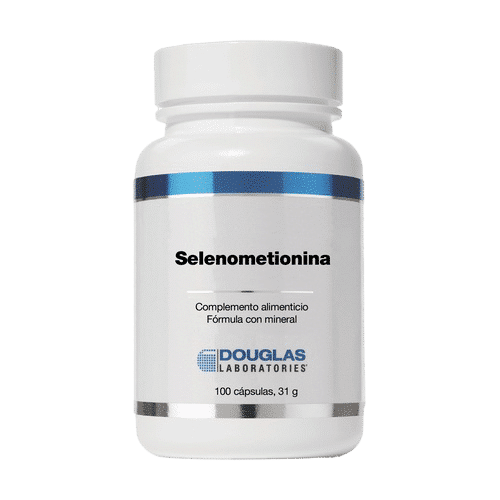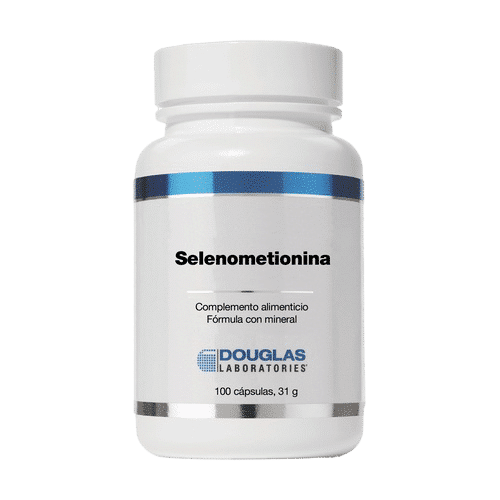Selenomethionine - Douglas
€27,00 EUR
Unit price
/
Unavailable
Selenomethionine - Douglas is backordered and will ship as soon as it is back in stock.
Description
Description
Selenium is an essential mineral that functions primarily to provide antioxidant activity to the body.
It works synergistically with vitamin E to reduce free radicals in cell membranes. Selenium is also associated with supporting a healthy immune system.
Douglas selenium capsules use selenium methionine as a source of selenium. This is a biologically active form. Selenomethionine is absorbed with near 100% efficacy, while selenate absorption is typically between 50% and 100%.
Several research studies recommend a daily dietary selenium intake of 55 to 75 mcg for adults, depending on age and gender. Selenium is a cofactor found in approximately 10 selenoproteins in the body, the most important of which appears to be glutathione peroxidase (GPX). GPX uses glutathione to reduce hydrogen peroxide, thus protecting cells and plasma from free radical damage. GPX activity depends on an adequate supply of dietary selenium.
Recently, selenium as selenocysteine was identified in the active site of iodothyronine deiodinases types 1 and 3, two important enzymes in regulating the formation and degradation of the active thyroid hormone, triiodothyronine (T3). Another important selenoprotein appears to be selenoprotein P, but its functions remain unclear. Selenium and vitamin E appear to have synergistic effects, as some signs of vitamin E deficiency in animals can be alleviated with dietary selenium.
Adequate selenium levels depend on a steady supply of selenomethionine in the diet because the body cannot synthesize it. Dietary selenium is generally well absorbed and utilized in the body.
The richest dietary sources of selenium are seafood and meat, followed by grains and dairy. Fruits and vegetables are generally low in selenium, and low selenium levels have also been found in vegetarian diets.
Selenium is an essential mineral that functions primarily to provide antioxidant activity to the body.
It works synergistically with vitamin E to reduce free radicals in cell membranes. Selenium is also associated with supporting a healthy immune system.
Douglas selenium capsules use selenium methionine as a source of selenium. This is a biologically active form. Selenomethionine is absorbed with near 100% efficacy, while selenate absorption is typically between 50% and 100%.
Several research studies recommend a daily dietary selenium intake of 55 to 75 mcg for adults, depending on age and gender. Selenium is a cofactor found in approximately 10 selenoproteins in the body, the most important of which appears to be glutathione peroxidase (GPX). GPX uses glutathione to reduce hydrogen peroxide, thus protecting cells and plasma from free radical damage. GPX activity depends on an adequate supply of dietary selenium.
Recently, selenium as selenocysteine was identified in the active site of iodothyronine deiodinases types 1 and 3, two important enzymes in regulating the formation and degradation of the active thyroid hormone, triiodothyronine (T3). Another important selenoprotein appears to be selenoprotein P, but its functions remain unclear. Selenium and vitamin E appear to have synergistic effects, as some signs of vitamin E deficiency in animals can be alleviated with dietary selenium.
Adequate selenium levels depend on a steady supply of selenomethionine in the diet because the body cannot synthesize it. Dietary selenium is generally well absorbed and utilized in the body.
The richest dietary sources of selenium are seafood and meat, followed by grains and dairy. Fruits and vegetables are generally low in selenium, and low selenium levels have also been found in vegetarian diets.
100 capsules
It works synergistically with vitamin E to reduce free radicals in cell membranes. Selenium is also associated with supporting a healthy immune system.
Douglas selenium capsules use selenium methionine as a source of selenium. This is a biologically active form. Selenomethionine is absorbed with near 100% efficacy, while selenate absorption is typically between 50% and 100%.
Several research studies recommend a daily dietary selenium intake of 55 to 75 mcg for adults, depending on age and gender. Selenium is a cofactor found in approximately 10 selenoproteins in the body, the most important of which appears to be glutathione peroxidase (GPX). GPX uses glutathione to reduce hydrogen peroxide, thus protecting cells and plasma from free radical damage. GPX activity depends on an adequate supply of dietary selenium.
Recently, selenium as selenocysteine was identified in the active site of iodothyronine deiodinases types 1 and 3, two important enzymes in regulating the formation and degradation of the active thyroid hormone, triiodothyronine (T3). Another important selenoprotein appears to be selenoprotein P, but its functions remain unclear. Selenium and vitamin E appear to have synergistic effects, as some signs of vitamin E deficiency in animals can be alleviated with dietary selenium.
Adequate selenium levels depend on a steady supply of selenomethionine in the diet because the body cannot synthesize it. Dietary selenium is generally well absorbed and utilized in the body.
The richest dietary sources of selenium are seafood and meat, followed by grains and dairy. Fruits and vegetables are generally low in selenium, and low selenium levels have also been found in vegetarian diets.
Selenium is an essential mineral that functions primarily to provide antioxidant activity to the body.
It works synergistically with vitamin E to reduce free radicals in cell membranes. Selenium is also associated with supporting a healthy immune system.
Douglas selenium capsules use selenium methionine as a source of selenium. This is a biologically active form. Selenomethionine is absorbed with near 100% efficacy, while selenate absorption is typically between 50% and 100%.
Several research studies recommend a daily dietary selenium intake of 55 to 75 mcg for adults, depending on age and gender. Selenium is a cofactor found in approximately 10 selenoproteins in the body, the most important of which appears to be glutathione peroxidase (GPX). GPX uses glutathione to reduce hydrogen peroxide, thus protecting cells and plasma from free radical damage. GPX activity depends on an adequate supply of dietary selenium.
Recently, selenium as selenocysteine was identified in the active site of iodothyronine deiodinases types 1 and 3, two important enzymes in regulating the formation and degradation of the active thyroid hormone, triiodothyronine (T3). Another important selenoprotein appears to be selenoprotein P, but its functions remain unclear. Selenium and vitamin E appear to have synergistic effects, as some signs of vitamin E deficiency in animals can be alleviated with dietary selenium.
Adequate selenium levels depend on a steady supply of selenomethionine in the diet because the body cannot synthesize it. Dietary selenium is generally well absorbed and utilized in the body.
The richest dietary sources of selenium are seafood and meat, followed by grains and dairy. Fruits and vegetables are generally low in selenium, and low selenium levels have also been found in vegetarian diets.
100 capsules



